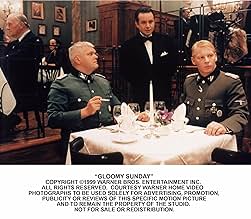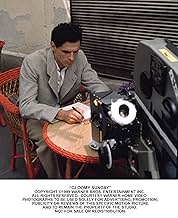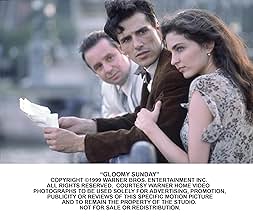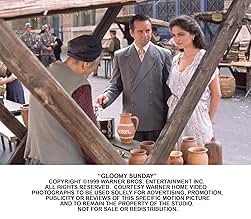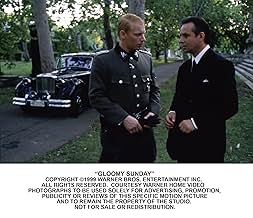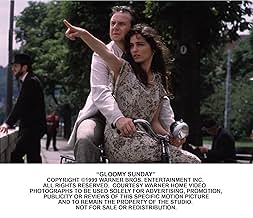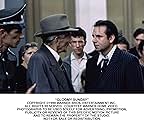IMDb-BEWERTUNG
7,8/10
8707
IHRE BEWERTUNG
Füge eine Handlung in deiner Sprache hinzuFollows three men who are in love with a beautiful waitress during World War II: an intellectual restaurant owner, a mysterious musician, and an erratic businessman.Follows three men who are in love with a beautiful waitress during World War II: an intellectual restaurant owner, a mysterious musician, and an erratic businessman.Follows three men who are in love with a beautiful waitress during World War II: an intellectual restaurant owner, a mysterious musician, and an erratic businessman.
- Regie
- Drehbuch
- Hauptbesetzung
- Auszeichnungen
- 7 Gewinne & 5 Nominierungen insgesamt
Empfohlene Bewertungen
I wrote this review in December of 2012 when the movie was titled "Gloomy Sunday." A great movie experience. I'm 82 (then) and had been watching movies since I was 18 months old, held in my mother's arms. This is an unforgettable film. Every facet is superb. The acting is flawless, the cinematography is breathtaking, and the gripping story has every human emotion imaginable. It's hypnotic from start to finish, but keep in mind, you have to be attentive. There are some subtle touches that can go unnoticed if you're not carefully observing and listening, and missing them can possibly deprive you of fully understanding and enjoying the fantastic ending. The skilled director doesn't use a heavy hand, and that's admirable. Every single actor gives a perfect performance. Having studied acting for five years, I must mention that they don't act, they behave. Erika Marozsán's portrayal is colossal!. I've fallen in love with her. Even if I were 18 months old now, there's a scene with Joachim Król I'd remember the rest of my life. I've viewed that particular scene about eight times. Gut-wrenching, yet inspirational. Never in my life have a watched any movie four times, and I just saw this one again for the fourth time... in one week! If not for IMDb and Netflix, I would never have heard of it. And it received no nominations for the Academy Awards. Ridiculous! This is truly a masterpiece! I'd never written a review for IMDb before this, but for this film I had to do it. I cannot praise this movie enough!
"Gloomy Sunday" was a movie I happen to see by chance. Apparently my city is the only city in North America that is showing this movie. It is playing in one theatre in a small suburb. My father and I went to see this movie he wanted to see it because we are Hungarian and wanted to hear what kind of music would be played. To my surprise I found that I had actually enjoyed the movie. My expectations were low, only because I didn't have a clue as to what to expect but, I'm very happy I saw this film. It's one of the best films I've seen so far this year. The movie is about a few things. One of it's main story-lines concerns a love triangle concerning Laszlo (Joachim Krol), Ilona (Erika Marazan) and Andras (Stefano Dionisi). Laszlo owns a restaurant and Ilona is his girlfriend. Laszlo is hoping to have some music in his restaurant and hires a piano player, Andras. Andras likes Ilona. And Ilona it seems likes Andras. So he movie it seems will be a love story set during the beginning of WW2. But, there's also another story building. Andras has written a song called "Gloomy Sunday". He has written for Ilona. But soon the song becomes a hit. It's a beautiful song that seems to have a very strange effect on whoever listens to it. Soon afterwards people are committing suicide. And here we have a case of fact stranger than fiction. For it is this part of the story that is actually true. "Gloomy Sunday" is based on this story with the love theme used as a backdrop. I don't know if or when this movie will be wider release in North America. But I hope people will go see this movie. In fact though I doubt that people from this country have even heard of this movie. Here is a movie that NEEDS to be better known. It is a small gem. *** out of **** or a 7\10.
"Gloomy Sunday (Ein Lied von Liebe und Tod)" is a very mittel-European take on "Jules et Jim."
It has resonance with "The Pianist," but was produced in 1999 and is only being released in the U.S. now. Based on an urban legend grounded in fact it demonstrates how a piece of music can perfectly capture the zeitgeist of its times, so much so that it influences people's lives to end them. The original facts, with a list of recordings, are documented at www.phespirit.info/gloomysunday/ which is how I knew to find Marianne Faithfull's recording in my collection to play as I write this.
A love quadrangle starts off as an open, free-spirited affair between a jovial restaurant owner and his high-spirited, sensual hostess, becomes a complex three-some with a sultry composer, then an uptight tourist gets tangled in their lives. But this is Budapest 1933 - 1945, and the personal becomes the political, as the restauranteur is Jewish, the tourist transforms into an S.S. officer, and the composer's signature melody haunts them and the airwaves throughout a Europe falling like dominoes.
While there are lovely shots of the bridges and narrow streets of Budapest in a warm, lush cinematography, especially as seen on desperate bicycle rides (in dress and high heels no less), much of the movie takes place in the restaurant, so that the passage of time and the resulting changing stresses are marvelously shown by the actors' body language. Some of the coincidences are a bit thick, but the political commentary up to the present is effectively pointed.
The melody only gains in power throughout the film and is much more timeless in capturing the feelings of the time -- and any parallel experiences--than the pop or patriotic music Americans associate with the period. From the untranslated credits, it seemed that the closing version in English is Artie Shaw's, though the lead singer wasn't identified there. In the film, the lyrics are an after-thought to try and capture the music's meaning.
It has resonance with "The Pianist," but was produced in 1999 and is only being released in the U.S. now. Based on an urban legend grounded in fact it demonstrates how a piece of music can perfectly capture the zeitgeist of its times, so much so that it influences people's lives to end them. The original facts, with a list of recordings, are documented at www.phespirit.info/gloomysunday/ which is how I knew to find Marianne Faithfull's recording in my collection to play as I write this.
A love quadrangle starts off as an open, free-spirited affair between a jovial restaurant owner and his high-spirited, sensual hostess, becomes a complex three-some with a sultry composer, then an uptight tourist gets tangled in their lives. But this is Budapest 1933 - 1945, and the personal becomes the political, as the restauranteur is Jewish, the tourist transforms into an S.S. officer, and the composer's signature melody haunts them and the airwaves throughout a Europe falling like dominoes.
While there are lovely shots of the bridges and narrow streets of Budapest in a warm, lush cinematography, especially as seen on desperate bicycle rides (in dress and high heels no less), much of the movie takes place in the restaurant, so that the passage of time and the resulting changing stresses are marvelously shown by the actors' body language. Some of the coincidences are a bit thick, but the political commentary up to the present is effectively pointed.
The melody only gains in power throughout the film and is much more timeless in capturing the feelings of the time -- and any parallel experiences--than the pop or patriotic music Americans associate with the period. From the untranslated credits, it seemed that the closing version in English is Artie Shaw's, though the lead singer wasn't identified there. In the film, the lyrics are an after-thought to try and capture the music's meaning.
Fact and fiction combine to provide a delightfully entertaining film about a restaurant in Budapest. Clientele flocked there for the good food, the good music and I daresay the beautiful Ilona who served on the tables. What more could one wish for? Unfortunately the good times do come to an end when the Nazis sweep into Hungary and decide forthwith to eliminate the Jewish population.
Strange as it may seem the whole theme of the film revolves around a plaintive tune which first gained popularity in Budapest, later in Europe and then the whole world. The words to the song called "Gloomy Sunday" are full of despair.
The clients who came to the restaurant always asked for this particular melody to be played on the grand piano. It is played many times during the film. It is haunting and addictive. We find ourselves wanting to hear it again and again such is its hypnotic power.
All praise to Erika Marozsan who provides the romantic interest as Ilona in the story. I am told she is a newcomer to the screen, but as an actor she will surely be much sought after in the future. She is beautiful and her close-ups full of feeling. She has lovely hands that caress a lover's face with such gentle charm. She is much admired by Lazlo (Joachim Krol) owner of the restaurant and also by Andras (Stefano Dionisi) newly appointed pianist and composer of "Gloomy Sunday".
All goes well for the threesome until the arrival of a Nazi officer (Ben Becker) who takes a fancy to Ilona despite her constant rebuttals. In their position of power Nazis have the means of disposing of people who stand in their way.
This is a film of contrasts. First we have the beautiful setting which is Budapest, romantic songs and people in love. Then we have the Nazi occupation, loss of freedom and threats of Auschwitz.
This film must be seen to the end. There is an amazing twist of Fate in the last few minutes and it seems to me that at last in some remarkable way justice is seen to be done.
Strange as it may seem the whole theme of the film revolves around a plaintive tune which first gained popularity in Budapest, later in Europe and then the whole world. The words to the song called "Gloomy Sunday" are full of despair.
The clients who came to the restaurant always asked for this particular melody to be played on the grand piano. It is played many times during the film. It is haunting and addictive. We find ourselves wanting to hear it again and again such is its hypnotic power.
All praise to Erika Marozsan who provides the romantic interest as Ilona in the story. I am told she is a newcomer to the screen, but as an actor she will surely be much sought after in the future. She is beautiful and her close-ups full of feeling. She has lovely hands that caress a lover's face with such gentle charm. She is much admired by Lazlo (Joachim Krol) owner of the restaurant and also by Andras (Stefano Dionisi) newly appointed pianist and composer of "Gloomy Sunday".
All goes well for the threesome until the arrival of a Nazi officer (Ben Becker) who takes a fancy to Ilona despite her constant rebuttals. In their position of power Nazis have the means of disposing of people who stand in their way.
This is a film of contrasts. First we have the beautiful setting which is Budapest, romantic songs and people in love. Then we have the Nazi occupation, loss of freedom and threats of Auschwitz.
This film must be seen to the end. There is an amazing twist of Fate in the last few minutes and it seems to me that at last in some remarkable way justice is seen to be done.
10crisbob
Beautiful Budapest, end of the thirties. Lazlo Szabo a middle-aged jew Hungarian runs a chic restaurant with a beautiful waitress,Ilona who is also his mistress. One day they decide to hire a pianist, and it's Ilona who choose. And it's a good choice because the handsome young man, Andras, creates a wonderful mood on the premises. Little by little he falls desperately in love with Ilona and composes specially for her a song, very melancholic, and a bit misterious. He calls it " Gloomy sunday ". This song brings surprisingly a lot of suicides. The love-triangle functions pretty well until the time a german customer, Hans, who comes regularly in the restaurant falls in love with Ilona, without success.A few years later the german army invades Hungary, Hans is back as a highly placed officer and the jewish condition of Lazlo is going to complicate the lives of the four protagonists. This movie is a master- piece and I'd bet if the film had been produced in Hollywood with Stone, Douglas and Harrison Ford, directed by Cassavetes it would have gained several Oscars. It has all a movie fan can expect from a good film -and more. Beautiful scenery, very good story, marvelous music, talent of the actors, and even a bit of sex. I rarely see a picture twice on the same day. This time I did.
Wusstest du schon
- WissenswertesWieck, the Nazi played by Ben Becker, is a fictionalized SS Col. Kurt Becher, who was acquitted in Nuremberg of war crimes and who ended up the richest man in Germany.
- PatzerAt a movie theater, the trio watches a newsreel that declares that the song "Gloomy Sunday" "drove 157 people in Hungary to suicide in the past eight weeks." It's unknown whether that statement ever actually appeared in a German newsreel during the war. There is no evidence that the song ever actually drove more than a handful of people--if any--to suicide.
- VerbindungenFeatured in Die Männer vom K3: Jugendliebe (1999)
- SoundtracksSzomorú Vasárnap/Gloomy Sunday
Music by Rezsö Seress
Lyrics by László Jávor
English lyrics by Sam Lewis (as Sam M. Lewis)
Akla Musikverlag Berlin
Top-Auswahl
Melde dich zum Bewerten an und greife auf die Watchlist für personalisierte Empfehlungen zu.
- How long is Gloomy Sunday?Powered by Alexa
Details
- Erscheinungsdatum
- Herkunftsländer
- Sprachen
- Auch bekannt als
- Ein Lied von Liebe und Tod - Gloomy Sunday
- Drehorte
- Produktionsfirmen
- Weitere beteiligte Unternehmen bei IMDbPro anzeigen
Box Office
- Bruttoertrag in den USA und Kanada
- 585.604 $
- Eröffnungswochenende in den USA und in Kanada
- 7.102 $
- 22. Juni 2003
- Weltweiter Bruttoertrag
- 646.532 $
- Laufzeit1 Stunde 52 Minuten
- Farbe
- Sound-Mix
- Seitenverhältnis
- 1.85 : 1
Zu dieser Seite beitragen
Bearbeitung vorschlagen oder fehlenden Inhalt hinzufügen

Oberste Lücke
What is the Spanish language plot outline for Gloomy Sunday - Ein Lied von Liebe und Tod (1999)?
Antwort

